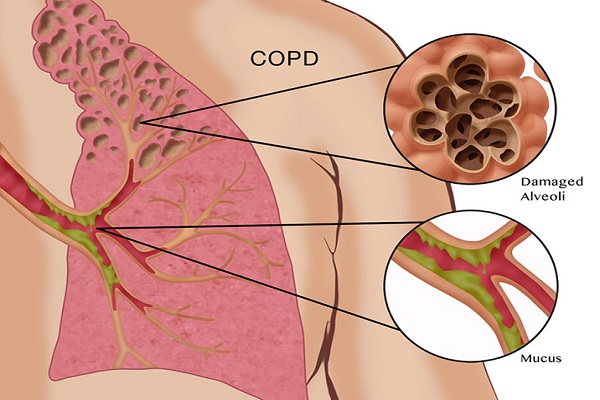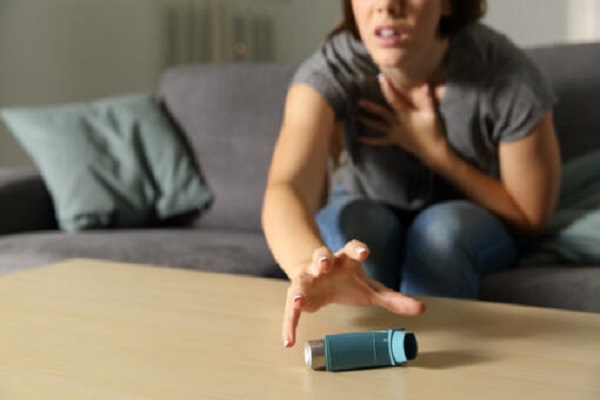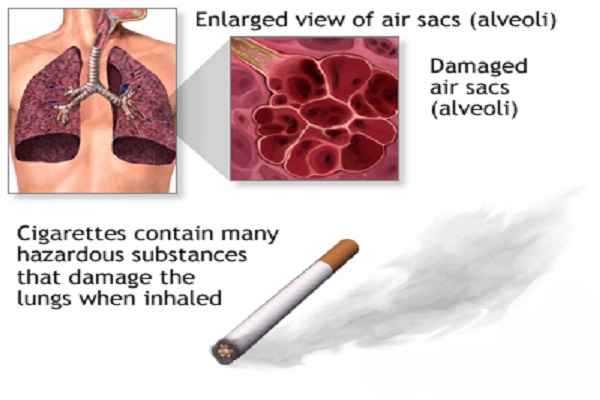Permanent lung damage caused by chronic obstructive pulmonary disease (COPD) starts much earlier than previously thought, even before patients are showing symptoms.
COPD is a chronic, progressive condition that slowly damages the tissues of the lungs. COPD can cause many complications, including: Respiratory infections, Heart problems, Lung cancer, High blood pressure in lung arteries, Depression. Currently, patients with mild disease, as determined by a lung function test, are given minimal or no treatment.

Symptoms
COPD symptoms often don't appear until significant lung damage has occurred, and they usually worsen over time, particularly if smoking exposure continues. For chronic bronchitis, the main symptom is a daily cough and mucus (sputum) production at least three months a year for two consecutive years.
Other signs and symptoms of COPD may include:
- Shortness of breath, especially during physical activities
- Wheezing
- Chest tightness
- Having to clear your throat first thing in the morning, due to excess mucus in your lungs
- A chronic cough that may produce mucus (sputum) that may be clear, white, yellow or greenish
- Blueness of the lips or fingernail beds (cyanosis)
- Frequent respiratory infections
- Lack of energy
- Unintended weight loss (in later stages)
- Swelling in ankles, feet or legs
People with COPD are also likely to experience episodes called exacerbations, during which their symptoms become worse than usual day-to-day variation and persist for at least several days.

Treatment
One aim of COPD treatment is to relieve symptoms, making everyday life easier and improving quality of life. A further aim is to slow down the progression of the disease and prevent exacerbations.
Medication is an essential part of daily COPD treatment. It can either be inhaled (breathed in) or taken in the form of tablets. Depending on how far the disease has progressed, combinations of various drugs are commonly used. The following medications are available:
- Drugs that open up (dilate) the airways (bronchodilators): These drugs are typically inhaled as a powder to make it easier to breathe. They include beta-2 agonists, anticholinergics, and methylxanthines.
- Steroid medication: Steroid sprays or tablets can reduce inflammation in the airways.
- PDE4 inhibitors: These tablets also have an anti-inflammatory effect.
At very advanced stages of COPD, oxygen therapy is often needed as well. Different types of oxygen therapy are used, depending on how severe the disease is.
If all other treatment options for severe pulmonary emphysema have been tried out, surgery is possible as well. Then the overinflated parts of the lungs are reduced in size through a procedure called bullectomy or through lung volume reduction surgery. A lung transplant may even be considered in some situations.
Supportive measures include physical exercise, breathing exercises, inhalation, or changes in diet. The aim of these programs is to provide consistent treatment in close cooperation with medical professionals to reduce the number of severe flare-ups and slow down the progression of the disease.
Diet recommendations for people with COPD
Inadequate nutritional status associated with low body weight in patients with COPD is associated with impaired pulmonary status, reduced diaphragmatic mass, lower exercise capacity, and higher mortality rates. Nutritional support is an important part of comprehensive care in patients with COPD.
A healthy diet is important for maintaining overall health. The stronger you are, the more able you’ll be to prevent complications and other health problems. Choose a variety of nutritious foods from these groups: vegetables/fruits/grains/protein/dairy/Drink plenty of fluids.
Drinking at least six to eight 8-ounce glasses of noncaffeinated liquids a day can help keep mucus thinner. This may make the mucus easier to cough out.
Limit caffeinated beverages because they can interfere with medications. If you have heart problems, you may need to drink less, so talk to your doctor.
Go easy on the salt. It causes the body to retain water, which can strain breathing.
Maintaining a healthy weight is important. It takes more energy to breathe when you have COPD, so you might need to take in more calories. But if you’re overweight, your lungs and heart may have to work harder.
If you’re underweight or frail, even basic body maintenance can become difficult. Overall, having COPD weakens your immune system and decreases your ability to fight off infection.
A full stomach makes it harder for your lungs to expand, leaving you short of breath. If that happens, try these remedies:
- Clear your airways about an hour before a meal.
- Take smaller bites of food that you chew slowly before swallowing.
- Swap three meals a day for five or six smaller meals.
- Save fluids until the end so you feel less full during the meal.
Lifestyle changes
Certain lifestyle changes may also help alleviate your symptoms or provide relief.
- If you smoke, QUIT. Your doctor can recommend appropriate products or support services.
- Whenever possible, avoid secondhand smoke and chemical fumes.
- Get the nutrition your body needs. Work with your doctor or dietician to create a healthy eating plan.
- Talk to your doctor about how much exercise is safe for you.

How is COPD Diagnosed?
Currently, City International Hospital applies the intensive obstructive lung disease screening package (COPD) & lung cancer by the following methods:
- Examining and exploiting medical history from specialists.
- Measurement of respiratory function
- CT scan does not contrast.
Internal Respiratory Specialists at City International Hospital recommend that smokers who are constantly exposed to polluted environments need to make lifestyle changes that can reduce COPD symptoms: quit smoking; avoid cigarette smoke and air pollution places; a diet enriched with vegetables, lean fish and grains; exercise regularly every day
The combination of medical measures and lifestyle adjustments can slow the progression of COPD and reduce the severity of symptoms. The best way to prevent COPD if you haven't already, or prevent COPD from getting worse is to quit smoking immediately and avoid cigarette smoke.
Screening for Chronic Obstructive Pulmonary Disease
Screening can be done by asking about smoking history and environmental or occupational exposure. In high-risk populations a screening spirometry should be obtained to document airway obstruction. Some experts advocate conducting screening spirometry in all patients with findings compatible with emphysema on chest x-ray or computed tomography of the chest. Significant pulmonary dysfunction may be present in asymptomatic smokers.
For appointment or screening service consultation, please contact:
- Ms. Võ Thị Mỹ Liên: (8428) 6280 3333, ext. 8424
- Ms. Nguyễn Thị Lệ: (8428) 6280 3333, ext. 8402
For appointment or more information about the services provided by the department, please contact:
Internal Medicine Department
- Nurse Station: (8428) 6280 3333, ext. 8241
- Patient service: (8428) 6280 3333, ext. 8330
City International Hospital
- Operator: (8428) 6280 3333, ext. 8035 or 8036
- Address: No. 3, 17A Street, Binh Tri Dong B Ward, Binh Tan Dist. (Next to AEON Mall Binh Tan). Ho Chi Minh City.
- Website: https://cih.com.vn/en/
- Email: This email address is being protected from spambots. You need JavaScript enabled to view it.










